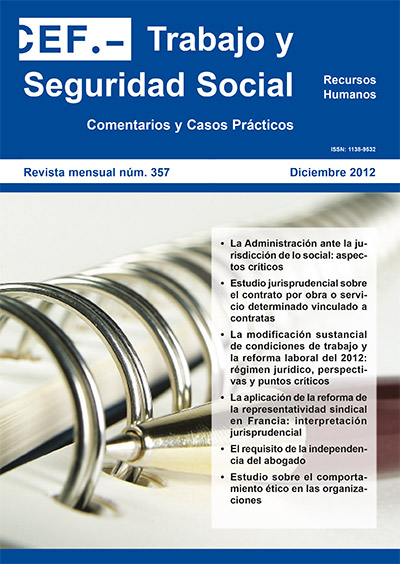Study on ethical behavior in organizations: why ethics are just words?
DOI:
https://doi.org/10.51302/rtss.2012.3477Keywords:
ethics, enterprise culture and commitmentAbstract
This research focuses on the behavioral factors of professional practice that enable or hinders the implementation of ethical business models. The paper aims to measure the degree to which present the «proto-ethical competence», in 187 Spanish companies, by means of the evaluation of the attitude that make possible the professional achievement from models committed with the environment and the people. The present study shows that the set of competencies defined (responsibility, commitment, respect, consistency, effort and sincerity) behaves as a single block. The study also analyzed differences of ethical behavior among different groups according to variables such as gender, age, sector, hierarchical level and organizational size. Additionally, the paper provides a tool to measure reliably the presence of these skills in a business environment.
Downloads
References
Álvarez, D. y Torres, F.J. [2005]: 100 preguntas sobre ética de la empresa, Madrid: Dykinson.
Cobo, J.M. [2001]: Ética profesional en ciencias humanas y sociales, Madrid: Huerga Fierro Editores.
Comunidad Europea [2004]: Proyecto Respect, Código para la conducta de la investigación social en la Unión Europea, http://www.respectproyect.org/code
Cortina, A. [1997]: Ciudadanos del mundo. Hacia una teoría de la ciudadanía, Madrid: Alianza.
Cortina, A. y Conill, J. [2000]: 10 palabras clave en ética de las profesiones, Estella: Verbo Divino.
Elegido, J.M. [1998]: Fundamentos de ética de empresas, México: IPADE.
Escámez, J. [1991]: «Actitudes en educación», en Altarejos, Francisco; Bouché, J. Henri; Escámez, Juan; Fullat, Octavi; Fermoso, Paciano; Gervilla, Enrique; Gil, Ramón e Ibáñez-Martín, José Antonio: Filosofía de la Educación Hoy, Madrid: Dykinson, págs. 525-539.
Escámez, J. y Gil, R. [2001]: La educación en la responsabilidad, Madrid: Paidós Ibérica.
Escámez, J. y Ortega, P. [1988]: La enseñanza de actitudes y valores, Valencia: Nau Llibres.
Etxeberria, X. [2002]: Ética de las profesiones, Bilbao: Desclée de Brouwer.
Fernández, J.L. y Hortal, A. [1994]: Ética de las profesiones, Madrid: Publicaciones de la Universidad Pontificia de Comillas.
Fisher, C. [2003]: «Developing a Code of Ethics for Academics. Commentary on Ethics for All: Differences across Scientific Society Codes», A Special Issue of Science and Engineering Ethics. The Role of Scientific Societies in Promoting Research Integrity, vol. 9, n.º 2, págs. 171-179.
Fontela, E. y Sainz, J.M. [2008]: Ética y legalidad en los negocios, Madrid: Difusión Jurídica y Temas de Actualidad.
Fontrodona, J. [2010]: La ética de la empresa en la encrucijada, Pamplona: EUNSA.
Goñi, J.L. [2011]: Ética empresarial y códigos de conducta, Madrid: La Ley-Actualidad.
Gorge, R.T. [1987]: «The Status of Business Ethics, Past and Future», Journal of Bussiness Ethics, vol. 6, págs. 201-211.
Guitián, G. [2011]: Negocios y moral. El dilema del camello y la aguja, Pamplona: EUNSA.
Hirsch, A. [2001]: Educación y valores, México: Ediciones Gernika.
Hirsch, A. y López, R. [2003]: «Elementos significativos de la ética profesional», en Ética profesional e identidad institucional, Universidad Autónoma de Sinaloa, México, pág. 28.
Hortal, A. [2002]: Ética general de las profesiones, Bilbao: Desclée De Brouwer.
Hoyk, R. y Hersey, P. [2008]: The Ethical Executive Becoming Aware of the root Causes of Unethical Behaviour: 45 Psychologycal Traps that Everyone of Us Falls Prey To, California: Standford University Press.
Hu, L. y Bentler, P.M. [1999]: «Cutoff criteria for fit indexes in covariance structure analysis: Conventional criteria versus new alternatives», Structural Equation Modeling, vol. 6, págs. 1-55.
Joreskog, K.G. [1967]: «Some contributions to maximum likelihood factor analysis», Psychometrika, vol. 32, págs. 443-477.
Lozano, J.F. [2000]: «Pedagogía de la ética de la Ingeniería», Revista Educación y Pedagogía, vol. XII, n.º 28, págs. 59-67.
Lozano, J.M. [1999]: Ética y empresa, Madrid: Trotta.
Martín, E. [2004]: Otro mundo es posible: diálogos sobre el comportamiento ético de las personas y las organizaciones, Madrid: Granica.
Mitchiam, C. [2003]: «Co-Responsibility for Research Integrity», A Special Issue of Science and Engineering Ethics. The Role of Scientific Societies in Promoting Research Integrity, vol. 9, n.º 2, págs. 273-290.
Patrus, R. [2007]: «La empresa ética: ¿un nuevo paradigma? condiciones, desafíos y riesgos del desarrollo de la business ethics», Gestão e Planejamento, vol. 8, n.º 1, págs. 16-33.
Pizzolante, I. [2009]: De la responsabilidad social empresarial a la empresa socialmente responsable, Madrid: Editorial Ciencias Sociales.
Sánchez-Martínez, M.; Sáez, J. y Svensson, L. [2003]: Sociología de las profesiones. Pasado, presente y futuro, Murcia: Diego Marín Librero-Editor.
Toulouse, G. [2003]: Mirada sobre la ética de las ciencias, Madrid: Ediciones del Laberinto.



















